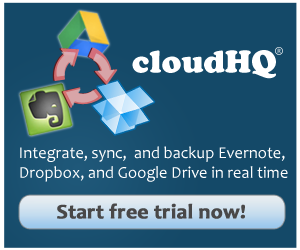
Small businesses face a host of challenges when making the decision to migrate to the cloud. Cloud services, organization, project management, security, cost, time management and other challenges can cause business owners headache after headache. And most of these cloud services do not play nice with each other. They are competitors, so they want to be the only cloud solution you need, although that is simply not true. Each cloud services has its own useful features in the cloud, and as of right now, I cannot point to one single cloud service and state that it has all the necessary features needed for a small business to successfully operate. In this article, we will take a look at some of the most popular cloud services and how you can synchronize and integrate them with each other to make your small business run efficiently in the cloud. We will also take a look at security and data loss, and the solution your small business needs to prevent the possibility of data loss ever again.
Cloud services
Small businesses incorporate many different cloud services due to the different features each cloud service offers, as well as client/customer/employee preference. For instance, you may use Evernote to keep track of notes and to-do lists, or to quickly snag articles and web clips, search for text in photos and much more. But to create documents, presentations and spreadsheets, you may use Google Drive. For large file storage and simple sharing, you may use Dropbox or Box. To collaborate with multiple people- employees, clients, customers or other sources, you may once again wish to use the top-notch collaboration features of Google Drive. Many employees, customers and clients use Gmail as their default email address as it’s free, easily accessible and integrates well with other Google products.
With all these different cloud services, it can be a lot to keep up, especially for small business owners that don’t incorporate a large IT department. Cloud synchronization and integration would make things much simpler, but the majority of cloud services do not offer sync or integration with other cloud services, mostly due to competitive practices.
Bring Your Own Device (BYOD)
Another challenge small business owners face is whether to use BYOD. Allowing employees to perform company duties on their own mobile devices certainly has its advantages. But security of company data and the possibility of lost or stolen mobile devices causes some concern in this area. Many business direct their IT department to install monitoring software on employees’ mobile devices to ensure they are using the device correctly; however, many small businesses cannot afford to implement this monitoring- many small businesses don’t even have a full-time IT department.
If business owners, managers and other workers use a specific cloud service to perform their work, while other employees may prefer to use different cloud services for their work. This doesn’t have to cause a conflict, as cloud integration and synchronization can merge the data from multiple cloud services together.
Integration and synchronization between cloud services
The solution to using multiple cloud services to perform company business is cloudHQ. I’ll give you a few examples.
- Your business loves to use Google Apps. You can create documents, spreadsheets and presentations in the cloud and export them in Microsoft Word format or other popular formats. But some of your customers and clients use Dropbox, while others use Box. You can use cloudHQ to merge two or more of these cloud services together so that your data is available in multiple cloud services. So now when you create a document in Google Drive, it will be automatically replicated to Dropbox (and Box if you desire).
- You might hate Monday morning meetings, especially when you must take notes. But with Evernote, you can take notes quickly and easily directly from your mobile device. You can type notes, dictate notes and take snapshots, then tag the notes for simple searching later. But let’s say you need the information from these meetings to use in company documentation. So now you have to search your Evernote database, choose the information you want to use in documents, then transfer it to a company computer or to Google Drive. But if you use cloudHQ, all of your Evernote notes (or just the notes and notebook stacks you specify) will be instantly replicated to Google Drive. And now you have all of your Evernote notes and company information stored in a single area which makes it MUCH easier to work on those company documents, spreadsheets and presentations.
- Evernote is one of the most popular and most useful apps for small businesses, but it does have one small drawback- it doesn’t offer the ability to export Evernote to PDF. But cloudHQ does. When you select a synchronization pair through cloudHQ, you are given the option to choose which formats your Evernote notes will be exported into. PDF is one of the most popular and most used formats and cloudHQ offers the ability to export Evernote to PDF, Microsoft Word, text and many other useful formats.
Back up your cloud to prevent data loss
As a small business owner, you know how devastating security breaches and data theft or loss can be. Most small business owners simply don’t have the means for top-of-the-line security systems and round-the-clock monitoring. So when a breach happens, it may go unnoticed for awhile, if it’s even noticed at all. Often, when an intruder breaches security, they are looking for information they can use for financial or other gain. If they get hold of company financial records, this could spell trouble for the company. If they get hold of other files and documents and delete them, this can also be disastrous.
Based on this study, nearly 80% of all companies experienced at least one data breach over the past 2 years. It also states that 62% of all small businesses do not routinely back up data. And one more stat- About a third of U.S. companies also had no backup and disaster recovery strategies in place, citing lack of budget and resources as primary reasons.
Well, the affordable solution for small businesses is obvious- cloudHQ. The backup security service for small businesses that cloudHQ provides is simple and easy-to-use: no costly IT department needed to run it.
Here’s an example of how it works:
Let’s say that your business uses multiple cloud services, but uses Dropbox as the main cloud account where everything is stored. You already use cloudHQ to sync data from Evernote to Dropbox, and Google Drive to Dropbox, etc. This way you have all of your company data in one centralized location for easy searching and simple accessibility. But if this main Dropbox account was to get breached by a malicious intruder, things will start to go very wrong for your small business.
If the intruder accesses your client information, legal documents, financial statements, confidential company information or other sensitive information and decides to delete all of this data, you will find yourself in a huge quandary if you don’t have competent, secure backup system such as cloudHQ in place. All of these records and documents will take time to replace- IF they can even ever be replaced. During this downtime, your company may lose contracts, lose business and lose money. Many small businesses go under when a crippling attack leaves them empty.
The attackers may delete all of your data, but they will be unaware that a complete secondary copy of all of your data is residing on a completely separate cloud account (thanks to cloudHQ). This cloud account should not have any of the same authentication (usernames, passwords, security questions, etc.) that ANY other company account has. As a matter of fact, the further you distance the secondary account from the company, the more likely it is that the attackers will never even know it exists. So when they delete all of your data, they think it’s gone, but little do they know that it is all still intact- organized in the same structure and able to be recovered within minutes.
The cloudHQ replication process is completely automated and runs in the background, so it causes no disruption to employees as they work. And every new file that is created or dropped into the main account is instantly replicated to the backup account. Any revisions to existing files in the main account are instantly replicated to the secondary account as well.
And some of the best news for small business owners – cloudHQ is totally affordable. Plans start at as little as $9.90 per month. And you can check out the Quick Tour page to see how simple cloudHQ is to set up. No costly IT department is needed to implement this excellent, affordable, cloud backup security system, and you will be able to rest easy, knowing that no matter what happens to your data, you will not lose it all. Choose the safe solution now – cloudHQ.
